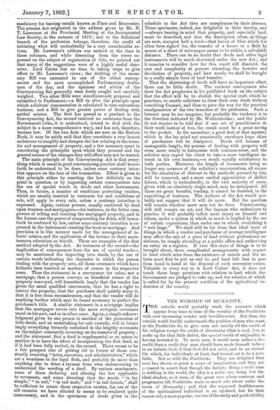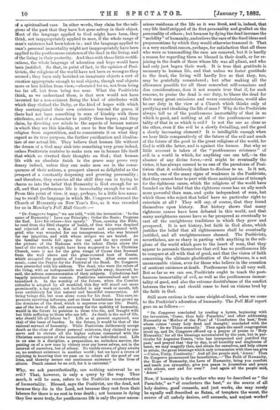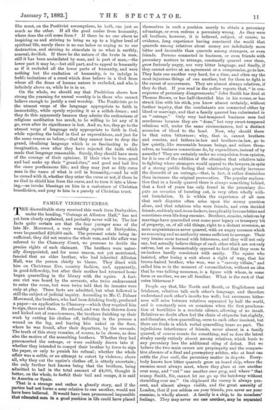THE WORSHIP OF HUMANITY.
THE outside world probably reads the accounts which appear from time to time of the worship of the Positivists with ever increasing wonder and bewilderment. But then, the outside world hardly understands the position of men who want, as the Positivists do, to give man not merely all the credit of his religion except the credit of discerning what is real, bat, to make up for that little defect, the special credit of originality in having invented it. To most men, it would seem rather a dis- credit than a credit that man should have made himself believe in an infinite God, if that God did not exist, and in an eternal life which, for individuals at least, had turned out to be a pure fable. Not so with the Positivists. They are delighted that man has shown so great a scope of imagination, and they are prepared to assert that though the Infinite Being outside man is nothing in the world, the idea is a noble one, being but the ideal shadow, as it were, of the great race whose common and progressive life Positivists make so much ado about under the name of Humanity; and that the supposed deathlessness of the spiritnalised individual is an egotised, but for that reason only a more popular, version of the unity and perfectibility of a spiritualised race. In other words, they claim for the reli-
gions of the past that they have but gone astray in their object. Most of the language applied to God might have been, they think, not inappropriately applied to man, if the whole range of man's existence had been taken in ; and the language applied to man's personal immortality might not inappropriately have been applied to the posthumous existence of the dead in the living, and of the living in their posterity. And then with those little rectifi- cations, the whole language of adoration and hope would have been justified. So that, in point of fact, in the opinion of Posi- tivists, the religions of the world have not been so wrong as they seemed ; they have only lavished on imaginary objects a sort of emotion appropriate enough to real objects, though real objects more or less hidden from view,—obscured for us, not from being too far off, but from being too near. What the Positivists think, as we understand them, is that men would not have invented for a non-existent Being the kind of attributes with which they clothed the Deity, or the kind of hopes with which they contemplated their own existence beyond the grave, if there had not been something in man of kinship with these attributes, and of a character to justify these hopes ; and they claim, by directing our minds to the aspects of human nature in which they see this kinship, at once to free the language of religion from superstition, and to concentrate it on what they regard as its true purpose, the further purification and idealisa- tion of our actual life. They believe that human life without the dream of a God may sink into something very gross indeed, unless Positivists contrive to make men see in human life itself that which so rivetted their thoughts on God ; that human life with an absolute finish in the grave may prove very dreary indeed, unless they can make men see in the conse- quences of their actions, a prospect almost as delightful as the prospect of a constantly deepening and growing personality ; and therefore, they exercise all the skill they can in trying to charm us into the belief that Humanity is God enough for us all, and that posthumous life is immortality enough for us all.
From this point of view, it may, perhaps, be a little less amaz- ing to recall the language in which Mr. Congreve addressed the Church of Humanity on New Year's Eve, as it was recorded for us in Monday's Pall Mall Gazette :— "Dr. Congreve began," we are told, "with the invocation : 'In the name of Humanity! Love our Principle ; Order the Basis; Progress the End. Live for others—live openly.' Then, opening the Bible, he read from the 53rd chapter of Isaiah, of One who was despised and rejected of men, a Man of Sorrows and acquainted with grief, who was wounded for our transgressions, who was bruised for our iniquities, and with whose stripes we are healed. As the familiar words fell upon the ear, and the eye rested on the picture of the Madonna with the infant Christ above the head of the reader, it might have been supposed to be a Christian Church, were it not for the grim visage of CEesar that frowned from the wall above and the glass-covered bust of Comte, which occupied the position of honour below. After some more music, came the Prayer for the Festival of the Dead. Dr. Congreve then proceeded with his address. The dead, who were the rulers of the living, with an indispensable and inevitable sway, deserved, he said, the solemn commemoration of their subjects. Catholicism had happily introduced the custom. Positivism universalised and sys- tematised it. In the worship of the future, when the Comtist calendar is adopted by all mankind, this day will stand out more prominently, a day apart, not included in any week or month, left over exclusively for this natural and beautiful consecration. All living beings die, but man alone cares for his dead. This cars re- presents surviving influence, and on these foundations has grown up the dominion of the dead, which is supreme over our life. Death, one of the laws of life, and necessary for the mobility of humanity, would in the future be painless to those who die, and fraught with bat little suffering to those who are left. As death is the end of life, why should life all labour be ? Life as at present organised, was that of the beast of burden. In the future, it would be that of the rational servant of humanity. While Positivists deliberately accept death as the close of direct personal exiatence, they claimed to pre- serve and to elevate all the higher notions connected with the Christian conception of the immortality of the individual soul. Life to us also is a discipline, a preparation, an unbroken service, the patting on of a new man by victory over our lower selves, not in the interest of ourselves, but of others. No visible crown of glory awaits us, no sentient existence in another world ; but we have a crown of rejoicing in knowing that we pass on to others all the good of our lives, and thereby secure our continuous existence in the lives of others. Death cannot be an evil, for it is universal."
Why, we ask parenthetically, can nothing universal be an evil ? That, however, is only a query by the way. Thus much, it will be seen, refers to the Positivist reconstruction
of Immortality. Blessed, says the Positivist, are the dead, not because they die in the Lord, not because they rest from their labours for there is no rest in true death ; not because in dying they live more truly, for posthumous life is only the poor uncon- scions residuum of the life as it was lived, and is, indeed, that
very life itself stripped of its first personality and grafted on the personality of others ; but because by dying the dead increase the "mobility" of humanity, and relieve the race of the fixed ideas and prepossessions by which they would otherwise trammel it. That is a very excellent reason, perhaps, for satisfaction that all those who were so trammelling the race are removed, but it is hardly a reason for regarding them as blessed in their death, or for re- joicing in the death of those whose life was all pliant, and who had only just begun their work. It is true that gratitude is necessary to human life, and that unless we foster gratitude to the dead, the living will hardly live so that they, too, may be gratefully remembered ; but after making all the allowance possible for all these somewhat sell-conscious and dim considerations, does it not remain true that if, for such reasons, to praise the dead is our duty, to blame the dead for their many great oinissions and worse commissions, would also be our duty in the view of a Church which thinks only of purifying and idealising the life of man ? Why do the Positivists always tell us of the posthumous immortality of that in us which is good, and nothing at all of the posthumous immor- tality of that in us which is evil ? Is not the one as clear as the other, even if the evil be a slowly dwindling, and the good a slowly increasing element? It is intelligible enough when we hear little comparatively of the future of the evil and much of the future of the good in the great religions of the world, for God is with the latter, and is against the former. But why so little account is taken of the "posthumous existence" of evil, in a world in which, for anything one can tell,—in the absence of any divine force,—evil might be eventually the victor, it has always seemed to us one of the paradoxes of Posi- tivism that it sedulously declines to disclose to us. Is it not, in truth, one of the many signs of weakness in the Positivists, that they cannot bear to part with those anticipations of triumph for the righteous cause, which the religions of the world have founded on the belief that the righteous cause has an ally much more powerful than man, and quite independent of man, but which those who reject that belief have no particular right to entertain at all ? They will say, of course, that they found themselves upon history. But history shows that many righteous causes have been defeated in this world, and that many unrighteous causes have so far prospered as eventually to cast off the unrighteous traditions in which they grew and prospered. It is not history, but faith in God alone, which justifies the belief that all righteousness shall be eventually justified, and all nurighteousness shamed. The Positivists, nevertheless, are so chary in parting with anything in the reli- gions of the world which goes to the heart of man, that they appear to persuade themselves that evil has no posthumous life to compare at all with that of good, and that the vision of faith concerning the ultimate glorification of the righteous, is a not unreasonable vision, even for those who believe in the cessation of sentient existence at death. Posthumous life is all very well.
But so far as we can see. Positivists ought to teach the post- humous immortality of evil, as well as the posthumous immor- tality of good, and also the extreme doubtfulness of the conflict between the two; and should cease to feed on visions bred by the faith in God.
Still more curious is the same sleight-of-hand, when we come to the Positivist's adoration of humanity. The Pall Mall report goes on as follows :— " Dr. Congreve concluded by reading a hymn, beginning with the invocation, Come, then holy Paraclete,' and after addressing Humanity as Mother of the Poor,' of Comforters the best,' from whom comes every holy deed and thought,' concluded with the prayer, Be we Thine eternally.' Then again the small congregation stood up, and Dr. Congreve offered up a prayer of praise to Holy Humanity,' for all the blessings accumulated by the past, but in par- ticular for Augustus Comte, who has interpreted and justified thy past,' and prayed that day by day, in all humility and singleness of heart, we may magnify thee, and attain for ourselves, and help others to attain, the great blessings which only communion with thee can give —Union, Unity, Continuity.' And all the people said, 'Amen.' Then Dr. Congreve prononuced the benediction,—' The Faith of Humanity, the Hope of Humanity, the Love of Humanity, bring you comfort and teach you sympathy, give you peace in yourselves and peaoe with others, now and for ever !' And again all the people said,
Amen.'" Now, if humanity is the mother who may be described as "the Pareelete," as "of comforters the best," as the source of all holy desires, good: counsels, and just works, she may surely be equally well described as Satan, of tempters the worst, the source of all unholy desires, evil counsels, and unjust works? She must, on the Positivist assumptions, be both, one just as much as the other. If all the good conies from humanity, where does the evil come from P If there be no one above us inspiring us and striving to bring us up to a higher level of spiritual life, surely there is no one below us urging us to our destruction, and striving to stimulate in us what is earthly, sensual, devilish. If there be the nature of the brute in man, still it has been assimilated by man, and is part of man,—the lower part it may be,—but still part, and to appeal to humanity as if it excluded all the lower parts of humanity, and were nothing but the exaltation of humanity, is to indulge in feeb13 imitations of a creed which does believe in a God from whom all the dross of human nature is excluded, and who is infinitely above us, while he is in us.
On the whole, we should say that Positivism shows how strong the yearning for unreal worship is in those who cannot believe enough to justify a real worship. The Positivists go to the utmost verge of the language appropriate to faith in immortality, while openly rejecting it as a selfish dream ; and they do this apparently because they admire the enthusiasm of religions meditation too much, to be willing to let any of it go, even after its significance is lost. And so, too, they go to the utmost verge of language only appropriate to faith in God, while rejecting the belief in God as superstitious, and just for the same reason as before,—that they cannot bear to drop the grand, idealising language which is so fascinating to the imagination, even after they have rejected the faith which made that language reasonable. Surely, they should have more of the courage of their opinions. If their view be true, good and bad make up their " grand-otre," and good and bad live the same posthumous life ; and they may just as fitly curse man in the name of what is evil in humanity,—and he will be cursed with it, whether they utter the curse or not, if there be no God to shield him from the curse, and to turn it into a bless- ing,—as invoke blessings on him in a caricature of Christian benediction, and pray to him in a parody of Christian trust.
















































 Previous page
Previous page